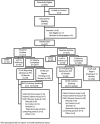Efficacy of a tobacco quitline among adult cancer survivors
- PMID: 25572620
- PMCID: PMC4355239
- DOI: 10.1016/j.ypmed.2014.12.019
Efficacy of a tobacco quitline among adult cancer survivors
Abstract
Objective: The purpose of the study (conducted 2010-2013) was to determine the efficacy of two common types of tobacco quitlines in adult cancer survivors who regularly smoked cigarettes.
Method: Adult onset cancer survivors in Memphis, Tennessee (n=427, 67% female, 60% Caucasian) were randomized either to a Proactive (i.e., counselor-initiated calls) or Reactive (i.e., participant-initiated calls) quitline. Both conditions also received nicotine replacement therapy. The primary outcome was biochemically-verified (i.e., salivary cotinine) smoking cessation.
Results: While 12-month self-reported abstinence was consistent with other published studies of smoking cessation (22% and 26% point prevalence abstinence for Proactive and Reactive conditions, respectively), 48% of participants who were tested for cotinine failed biochemical verification, indicating a considerable falsification of self-reported cessation. Adjusted cessation rates were less than 5% in both intervention conditions.
Conclusion: Our results are consistent with other studies indicating that traditional smoking cessation interventions are ineffective among cancer survivors. Moreover, self-reports of cessation were unreliable in cancer survivors participating in a quitline intervention, indicating that future studies should include biochemical verification. Given the importance of smoking cessation among cancer survivors and low cessation rates in the current study, it may be necessary to design alternative interventions for this population. ClinicalTrials.gov identifier: NCT00827866.
Keywords: Adults; Cancer; Intervention studies; Smoking cessation; Survivors.
Copyright © 2015 Elsevier Inc. All rights reserved.
References
-
- Benowitz NL, et al. Biochemical verification of tobacco use and cessation. Nicotine Tob. Res. 2002;4(2) - PubMed
-
- Benowitz NL, et al. Optimal serum cotinine levels for distinguishing cigarette smokers and nonsmokers within different racial/ethnic groups in the United States between 1999 and 2004. Am. J. Epidemiol. 2009;169(2):236–248. - PubMed
-
- Browman GP, et al. Influence of cigarette smoking on the efficacy of radiation therapy in head and neck cancer. N. Engl. J. Med. 1993;328(3):159–163. - PubMed
-
- Cooke F, et al. Diagnostic accuracy of NicAlert cotinine test strips in saliva for verifying smoking status. Nicotine Tob. Res. 2008;10(4):607–612. - PubMed
Publication types
MeSH terms
Associated data
Grants and funding
LinkOut - more resources
Full Text Sources
Other Literature Sources
Medical


